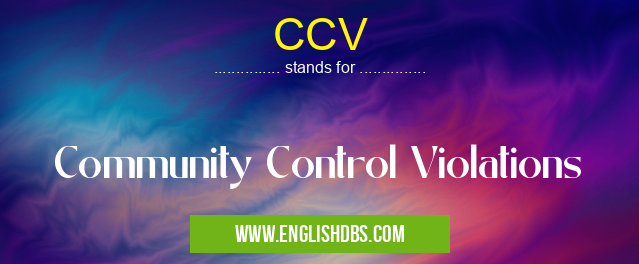What does CCV mean in COMMUNITY
CCV stands for Community Control Violations. It is a term used to describe violations of the conditions of parole or probation, which are imposed on individuals who have been found guilty of a crime and have been released from jail or prison.

CCV meaning in Community in Community
CCV mostly used in an acronym Community in Category Community that means Community Control Violations
Shorthand: CCV,
Full Form: Community Control Violations
For more information of "Community Control Violations", see the section below.
What are CCVs?
CCVs can include a wide range of behaviors, such as:
- Failing to report to a parole or probation officer as required
- Committing new crimes
- Using drugs or alcohol
- Associating with known criminals
- Failing to comply with court-ordered treatment programs
Consequences of CCVs
Violating the conditions of parole or probation can have serious consequences, including:
- Revocation of parole or probation
- Reincarceration
- Additional fines or sanctions
Avoiding CCVs
To avoid CCVs, individuals on parole or probation should:
- Strictly follow the conditions of their release
- Report to their parole or probation officer as required
- Avoid contact with known criminals
- Refrain from using drugs or alcohol
- Participate in all court-ordered treatment programs
Essential Questions and Answers on Community Control Violations in "COMMUNITY»COMMUNITY"
What are Community Control Violations (CCVs)?
CCVs are violations of the conditions set forth in a community control order, which is a court-ordered alternative to incarceration. These conditions may include restrictions on movement, contact with others, employment, and behavior.
What are the consequences of violating a CCV?
Violating a CCV can result in a range of consequences, including:
- Reinstatement or extension of the community control order
- Modification of the community control conditions
- Revocation of community control and imposition of a jail or prison sentence
What are some examples of CCVs?
Common examples of CCVs include:
- Failing to report to the probation or parole officer as required
- Leaving the designated geographic area without permission
- Consuming alcohol or illegal drugs
- Associating with known criminals or gang members
- Engaging in violent or criminal behavior
How can I avoid violating a CCV?
To avoid violating a CCV, it is important to:
- Understand the conditions of your community control order and follow them carefully
- Report any changes in your circumstances to your probation or parole officer promptly
- Stay away from people and places that could lead you to violate the conditions
- Seek support from family, friends, or a therapist if needed
Who is responsible for enforcing CCVs?
CCVs are enforced by probation or parole officers, who are typically employed by the court or a government agency. They are responsible for monitoring compliance with the conditions of the community control order and reporting any violations to the court.
Final Words: CCVs are a serious matter that can lead to significant consequences. Individuals on parole or probation should take steps to avoid violating the conditions of their release by adhering to the guidelines and seeking support from their parole or probation officer. By following the rules and living a law-abiding life, individuals can increase their chances of successfully completing their parole or probation and avoiding further legal problems.
CCV also stands for: |
|
| All stands for CCV |
